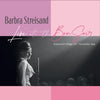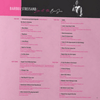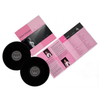





Barbra Streisand - Live At The Bon Soir (2LP, Digital Mixing)
Legendary 1962 debut recording never previously released
Barbra Streisand - vocals
Uncredited orchestra
Written by Leonard Bernstein (A1, A4), Tom Jones (A2, B4), Harvey Schmidt (A2, B4), Harold Arlen (A3, A5, B6, C2-3), E.Y. Harburg (A3, A5), Arthur Hamilton (A6), Jeff Harris (B1), Oscar Hammerstein II (B2), Sigmund Romberg (B2), Cole Porter (B5), Ted Koehler (B6), Jack Yellen (B7), Milton Ager (B7), Andy Razaf (C1), Thomas "Fats" Waller (C1), Truman Capote (C2), Johnny Mercer (C3), Richard Rodgers (C4, D1, D4), Lorenz Hart (C4, D1, D4), Frank Churchill (C5), Ann Ronell (C5), Bobby Scott (D2), Ric Marlow (D2), Frank Loesser (D3), Herman Ruby (D5), Joseph Meyer (D5), Billy Barnes (D6)
2LP, Tip-On Gatefold Jacket with a 12 page booklet including performance photos
Original analog Master tape : YES (Digital Mixing)
Heavy Press : 180g
Record color : black
Speed : 33 RPM
Size : 12'’
Stereo
Studio
Record Press : Record Technology Incorporated
Label : Impex
Original Label : Columbia (Master Tapes)
Recorded live November 4 – 6, 1962 at The Bon Soir Nightclub, New York City
Produced by Barbara Streisand, Martin Erlichman, and Jay Landers
Mixed by Jochem van der Saag in 24 bit/96 kHz
Mastered by Paul Blakemore with an all-analog signal-processing chain
Lacquer cut by Bernie Grundman at Bernie Grundman Mastering
Originally released in November 2022 (as a CD)
Reissued in September 2023 (first time on LP)
Tracks:
Side A:
- Introduction by David Kapralik / My Name Is Barbra
- Much More
- Napoleon
- I Hate Music
- Right As the Rain
- Cry Me A River
Side B:
- Value
- Lover, Come Back to Me
- Band Introductions
- Soon It's Gonna Rain
- Come to the Supermarket (In Old Peking)
- When the Sun Comes Out
- Happy Days Are Here Again
Side C:
- Keepin' Out of Mischief Now
- A Sleepin' Bee
- I Had Myself A True Love
- Bewitched, Bothered and Bewildered
- Who's Afraid of the Big Bad Wolf?
Side D:
- I'll Tell the Man in the Street
- A Taste of Honey
- Never Will I Marry
- Nobody's Heart Belongs to Me
- My Honey's Lovin' Arms
- I Stayed Too Long At the Fair
Reviews :
These time-honored songs, lovingly curated, arranged, and performed by pianist/vocalist Patricia Barber and her band, are at last seeing the light of day when the world needs them more than ever. Pristinely recorded, Clique assembles what began as encores to live performances into an experience all its own. The album comes out of the same sessions that gave us Higher (see review for All About Jazz here), which immersed the fortunate listener in a world shaped by art song and poetry, only now shed of its shadows and reveling in the city lights. "This music is fun, like Patricia Barber without the dark side," is how she describes her project in a recent phone interview. "We'd been booked for four days in the studio but finished Higher in two. Since the band was already there and tight from having been on the road, it was easy for me to pull these out."
There is indeed an ease that characterizes her vocal delivery of Jobim's "Samba de Uma Nota Só / One Note Samba" and the Rodgers and Hammerstein bon mot "Shall We Dance?" Appearances by Neal Alger (acoustic guitar) on the former and Jim Gailloreto (tenor saxophone) add to the nostalgia of these familiar grounds, though it's her core trio, led by the bandleader's keystrokes, that does much of the heavy lifting. Linked arm in arm with bassist Patrick Mulcahy and drummer Jon Deitemyer, she first croons her way onto the rain-slicked streets of "This Town" as if it were the most natural thing in the world.
"In some ways, I'm a control freak," Barber admits of her sound. "These are arrangements. This particular group is one I cherish, so everyone gets time to play. So, while it's stylized, they definitely have an input." Said input is front and center in "The In Crowd," which tracks its nerve impulses outwardly from a spinal bass line. In this and "Trouble Is A Man," Barber shows that her greatest powers as a singer tend to reside in her quietest inflections. From a near whisper, she is able to elicit deep lyrical and emotional conflicts. Chalk this as another victory for Jim Anderson, whose engineering ensures both fine separation and artful blend. "He just gets better," says Barber of the producer with whom she has worked for the better part of three decades. "In my music in general, I value silence as much as I value presence, and he's able to capture that perfectly."
Even when her voice hangs its hat for an instrumental interlude, Barber ensures that the audience, however virtual, is never forgotten. Whether turning the kaleidoscope of her original "Mashup" or navigating the burnished corridors of Monk's "Straight No Chaser," she allows freer energies to occupy the foreground. Notes Barber, "This is a very good representation of what you will hear when you come to see us live. It was true to what this band was playing at the time. We worked very hard on pulling melody away from the rhythm as we know it. It takes a very quiet space and musicians who are listening closely to do that."
Their synergy is especially apparent on "I Could Have Danced All Night," in which the drum kit seems to spread its wings around us as Barber takes a half-lit stage with poise. The sonic whetstone along which she sharpens such tunes is indicative of their somewhat unusual choosing. "When people hear 'standards album,' they're expecting the classic American Songbook of the 30s, but these are from the 50s and 60s, one of my favorite eras. I would call it a covers album." In that spirit, Barber takes the metaphorical connotations of the concept to their fullest, dressing melodies and harmonizing with freshly tailored clothing.
In that respect, one can't help but hear Clique and Higher as complementary. Whereas the earlier release broke new harmonic ground for vocal jazz music and was the result of six years of writing, here we are treated to a set of comforts we know and love. Barber is acutely aware of the timing as well: "This is a pleasant album to throw on right now, though I am disoriented by having a record come out that I can't perform with." How fortuitous, then, that she should end with Stevie Wonder's "All In Love Is Fair." Its sincerity speaks to the heart of the matter and unpacks for us the album's multivalent title, which Barber picked from among a handful of choices because, in her words, "it sounded like the kind of jazz club you'd want to be a part of." Thankfully, not even a pandemic can keep us from walking through its doors, taking a seat, and opening our ears to the hope of a brighter future.” Tyran Grillo, All About Jazz, August 2021
“Barbra Streisand generated a small but insistent degree of show biz buzz with her star-making role in the Broadway musical I Can Get It for You Wholesale when she signed with Columbia Records -- one of the biggest and most prestigious labels of the day -- in 1962. Streisand was drawing crowds and charming critics with her appearances at the Bon Soir, a nightclub in New York's Greenwich Village, and Columbia felt capturing her live show might be a good way to introduce her to a larger audience. As it happened, the Bon Soir's acoustics made it difficult to make a properly balanced recording, and after hearing the tapes Columbia's engineers delivered, the label chose to put Streisand in the studio to create a splashier and more sonically controlled recording. The Bon Soir recordings went into the vault, and while bits and pieces were bootlegged over the years, the projected live album didn't materialize until 2022, when advanced spectral editing technology made it possible to give the tapes a better mix. 60 years after it was recorded, Live at the Bon Soir gives us a rare chance to hear Streisand when she was a relatively unknown talent -- a window of time that didn't last long, given the massive success of 1963's The Barbra Streisand Album -- and performing with a remarkable combination of vocal skill, performance savvy, and a youthful delight in the interaction between herself, her musicians, and her audience. (How unknown was she in November 1962? The Columbia executive who introduces her mispronounces her name, unimaginable a year later.) All 11 songs that appeared on The Barbra Streisand Album are included here, along with 12 others. While the studio recordings were given splashy arrangements by Peter Matz, Live at the Bon Soir featured Streisand backed by a modest, skillful quartet led by pianist Peter Daniels; though they lend superb support, they know enough to stay out of her way. Streisand's voice is front and center on Live at the Bon Soir, and it's hard to imagine anything upstaging her. Only 20 years old, Streisand's control of her instrument is already dazzling, and her phrasing and dynamics are remarkably clever and sophisticated; she knows exactly what to do with this material, and delivers a set that nods to cabaret traditions as she puts a fresh and exciting spin on the art of nightclub singing. As polished and expert as she sounds here, there's a sincere giddiness and good humor in her more playful numbers and between-song patter, reflecting the joy of an artist just learning to make her gifts work to her advantage. Streisand's popularity outgrew the confines of a small club with impressive speed, and Live at the Bon Soir documents a very brief moment when she was just learning how to wow an audience. It clearly took very little time for that lesson to take, and this is a glorious archival find.” AllMusic Review by Mark Deming
Ratings:
AllMusic : 4.5 / 5 ; Discogs : 4.75 / 5


